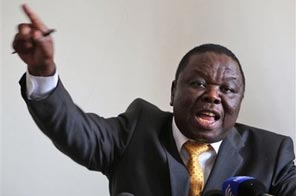Zimbabwe PM boycotts unity govt
HARARE: Citing the "persecution" of a top aide, Zimbabwe's prime minister abandoned — at least temporarily — shared rule with President Robert Mugabe, marking a setback to the country's struggle to emerge from political gridlock, economic collapse and international isolation and sanctions.
Morgan Tsvangirai told reporters Friday his party members would not attend Cabinet meetings or engage in other executive work with Mugabe's party. His erstwhile governing partners said good riddance, even though both sides need the coalition.
"Until confidence has been restored we can't continue to pretend that everything is well," Tsvangirai said, referring to a trial scheduled to begin Monday against Roy Bennett, the prime minister's nominee for deputy agriculture minister who is charged with weapons violations.
The charges are linked to long-discredited allegations that Tsvangirai's Movement for Democratic Change plotted Mugabe's violent overthrow.
"We are not really pulling out officially," Tsvangirai said, assuring a press conference that his move did not spell the collapse of the government. But he made it clear his party members would not attend Cabinet meetings or engage in other executive work with Mugabe's ZANU-PF party. The MDC will continue parliament activities.
U.S. State Department spokesman Ian Kelly said Friday that Washington understood "the frustration" of Tsvangirai's party, and called on Mugabe to make the power-sharing agreement work.
"This is an agreement that Mr. Mugabe himself signed, and he hasn't taken the concrete steps to show a commitment to democratic reform and opening up his political system," Kelly said.
Friday's move demonstrates deep unhappiness within Tsvangirai's party with the coalition. But Tsvangirai has repeatedly said he sees the coalition as the only way to ensure Zimbabwe's future.
The indifferent reaction from Mugabe's ZANU-PF party underlined tensions within the coalition.
"If MDC wants to disengage ... we don't have a problem with that," said Ephraim Masawi, a ZANU-PF spokesman. "We were having problems with MDC, working together. We have been trying but it was not easy."
Tsvangirai and Mugabe entered the unity government in February after two violence-plagued elections left the country at a political standstill and in economic ruin.
Zimbabwe's neighbors had urged Mugabe, who has held power since independence in 1980, to form the partnership with Tsvangirai, a former labor leader. In forming their coalition, the longtime opponents pledged to work together to turn around the country's economic and political collapse.
Since the coalition was formed, Tsvangirai has condemned continuing human rights violations. Mugabe has demanded that Tsvangirai do more to get international sanctions lifted and foreign aid and investment restored.
Tsvangirai had nominated Bennett as deputy agriculture minister in the coalition. Bennett was arrested the day the Cabinet was sworn in in February. He denies the charges against him. Bennett had been free on bail since March, but that was revoked earlier this week.
"Roy Bennett is not being prosecuted, he is being persecuted," Tsvangirai said.
The coalition is Mugabe's only hope for taking Zimbabwe out of international isolation, and it has brought Tsvangirai closer to power than any election.
Foreign governments and multilateral donors have expressed support for Tsvangirai, warmly welcoming him on a recent international tour. But concerns persist about propping up Mugabe, accused of trampling on democracy and ruining a once prosperous economy. Even with Tsvangirai in the government, donors prefer not to give money directly to Zimbabwe's treasury, instead working through independent aid groups.
Last month, the European Union said it would not remove sanctions targeting Mugabe and his loyalists or resume development aid until Mugabe does more to make power sharing work and restore human rights.
Bennett's lawyers persuaded a Harare High Court judge on Friday to restore bail. Hours later, after his lawyers rushed the order to jail authorities in Mutare, 170 miles (270 kilometers) east of the capital, reporters watched Bennett walk free. Bennett told reporters he would spend the weekend in Harare and he return to Mutare Monday for his trial's start.
The European Union said Thursday it is "deeply concerned" over Bennett's jailing. The bloc added it regrets "that politically motivated abuse persists in the country."
In Washington Thursday, U.S. State Department spokesman Robert Wood told reporters that the case against Bennett is a "blatant example of the absence of the rule of law in Zimbabwe."






